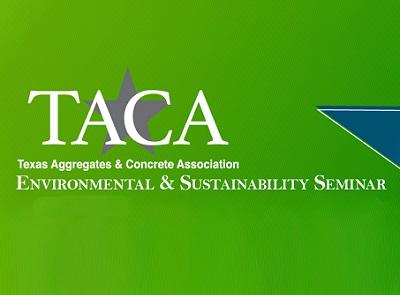 The Texas Aggregates & Concrete Association (TACA) – the leading state trade association for the aggregate, concrete, cement and associated industries – welcomed more than 90 attendees to its Environmental & Sustainability Seminar on Sept. 10-12 at the Marriott Riverwalk in San Antonio, Texas.
The Texas Aggregates & Concrete Association (TACA) – the leading state trade association for the aggregate, concrete, cement and associated industries – welcomed more than 90 attendees to its Environmental & Sustainability Seminar on Sept. 10-12 at the Marriott Riverwalk in San Antonio, Texas.
At the conference, TACA had its “WIN-WIN-WIN: The Financial and Community Power of Conservation Easements” panel. This panel explored what happens when mining companies consider their post-mining land uses, and – in concert with land trusts – seek to capture the land’s remaining value. Panel thought leaders included Jim Bradbury, attorney-at-law; Tim Mallicoat, president and CEO, Rasmussen Group that operates the Hallett Materials Company in Texas; and Lori Olson, executive director, Texas Land Trust Council. Jill Boullion, executive director, Bayou Land Conservancy, moderated the discussion.
Panel details
Olson kicked off the panel by defining just what a conservation easement is: “a written, legal agreement between a property owner and a ‘holder’ of the conservation easement, under which a landowner voluntarily restricts certain uses of the property in order to protect its natural productive or cultural features.” In 90 percent of the cases, she said, the holder is a land trust, of which there are 33 operating in Texas. The other 10 percent of holders would be a government entity.
Bradbury, who has handled many of these contracts, said conversation easements go well beyond the initial transaction. “The ability to plan for a piece of property and define its uses in advance is invaluable to a landowner and the surrounding community.”
According to the Texas Land Trust Council, more than 85 percent of residents live in urban areas. Additionally, more than 95 percent of the state’s land is privately owned. With a conservation easement, landowners retain ownership of the land, but manage the property in partnership with the land trust.
Benefits from conservation easements
Panelists agreed that all parties involved – the landowners (many of whom are aggregate mining operators), land trusts and local communities – can realize significant benefits from conservation easements. These include tax benefits to the landowner in the form of IRS tax breaks. It also includes appraisal reductions and, in some cases, cash back. And, of course, preserving natural habitats.
Mallicoat, whose group operates sand and gravel companies in the Houston area, said conservation easements have been beneficial. “We are able to preserve and mitigate wetlands on our properties, which are monitored by the Bayou Land Conservancy land trust, along with our own environmental specialists. With the conservation easement, we are doing what we want to and are supposed to be doing.”
Bradbury concluded with some advice. “The best thing to do if you have a valuable piece of land on your property is to have the land trust check it out.”
For further information on how TACA member companies enhance our daily lives, please visit www.tx–taca.org.
About TACA
The Texas Aggregates & Concrete Association (TACA) is the main resource for the aggregate, concrete, cement and other associated industries in Texas. The association represents its member companies by providing industry information to the public, media, policymakers and also regulators; advocating for industry issues; ensuring member companies commit to conducting business with integrity, respect, transparency and honest communication; and creating industry training courses and materials that help members effectively manage their businesses.













